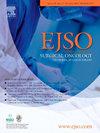The survival and prognostic factors of head and neck cancer patients over the age of 80 in comparison to their younger counterparts: Cohort study
IF 3.5
2区 医学
Q2 ONCOLOGY
引用次数: 0
Abstract
Objective
The aim of this study was to compare the overall survival and prognostic factors of patients ≥80 years old with those of patients aged 70–79 years who were diagnosed with head and neck squamous cell carcinoma.
Materials and methods
A retrospective study was conducted between 2013 and 2021. Patients were divided into two groups: group-1, aged ≥80 years, and group-2, aged between 70 and 79 years; all patients were diagnosed with squamous cell carcinoma of the head and neck and treated with curative intent.
Results
A total of 346 patients were included, and 162 were aged older than 80 years. There was no difference in overall survival between the two groups, with a median of 39 months (95 % CI: 24–47) for those aged >80 years and 41 months (95 % CI: 31–67) for those aged 70–79 years. The same finding was observed for recurrence-free survival, with a median of 33 months (95 % CI 21–45) for patients in group-1and 34 months (95 % CI 29–39) for patients in group-2. Stratified analyses revealed a poorer prognosis for patients with locally advanced disease and combined treatment with surgery and radiotherapy for overall survival. A locally advanced stage was the only factor impacting recurrence-free survival. Furthermore, age was not considered a prognostic factor for overall or recurrence-free survival. On the other hand, the PS score, ASA score, and G8 score were significant factors.
Conclusion
This study revealed that advanced age was not an independent risk factor for survival and should not justify suboptimal treatment for elderly patients aged 80 years or older. Certain scores, such as the PS and G8 score, appear to be more reliable prognostic factors for oncological outcomes after treatment.
求助全文
约1分钟内获得全文
求助全文
来源期刊

Ejso
医学-外科
CiteScore
6.40
自引率
2.60%
发文量
1148
审稿时长
41 days
期刊介绍:
JSO - European Journal of Surgical Oncology ("the Journal of Cancer Surgery") is the Official Journal of the European Society of Surgical Oncology and BASO ~ the Association for Cancer Surgery.
The EJSO aims to advance surgical oncology research and practice through the publication of original research articles, review articles, editorials, debates and correspondence.
 求助内容:
求助内容: 应助结果提醒方式:
应助结果提醒方式:


